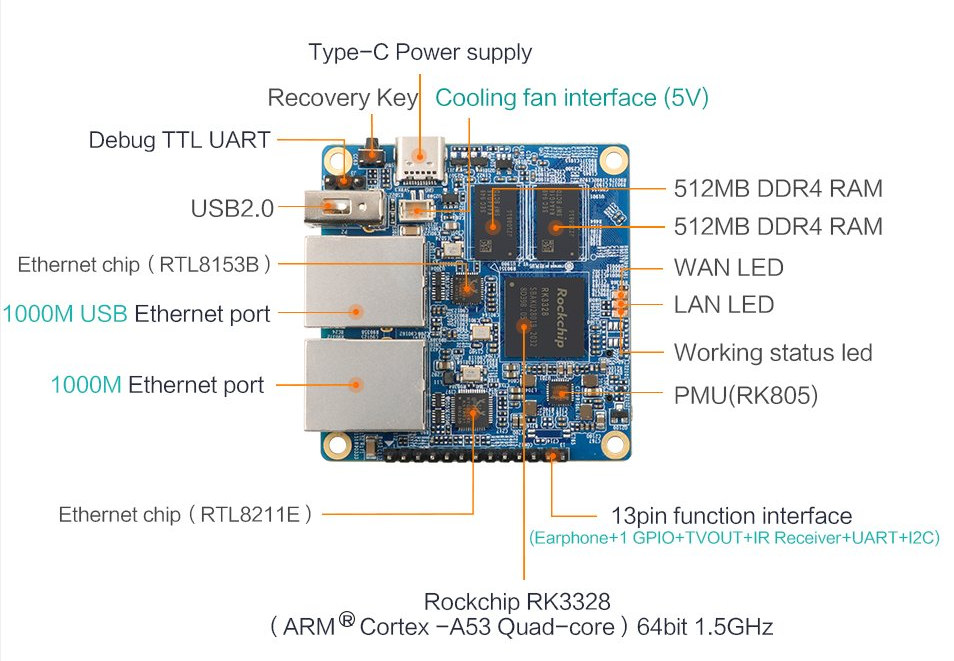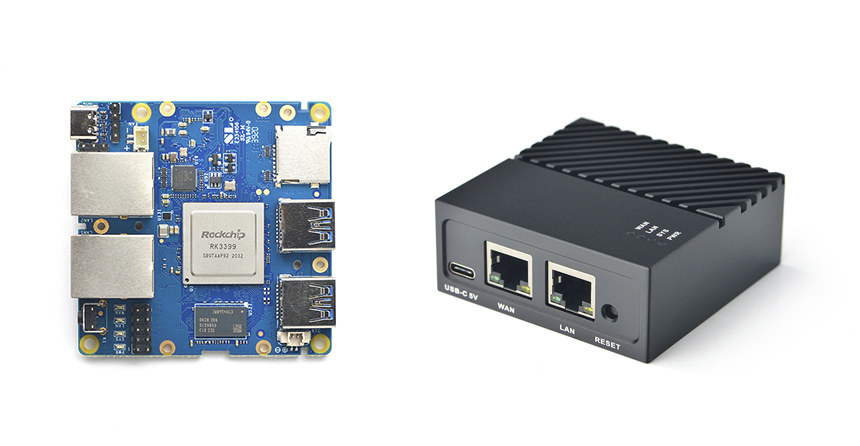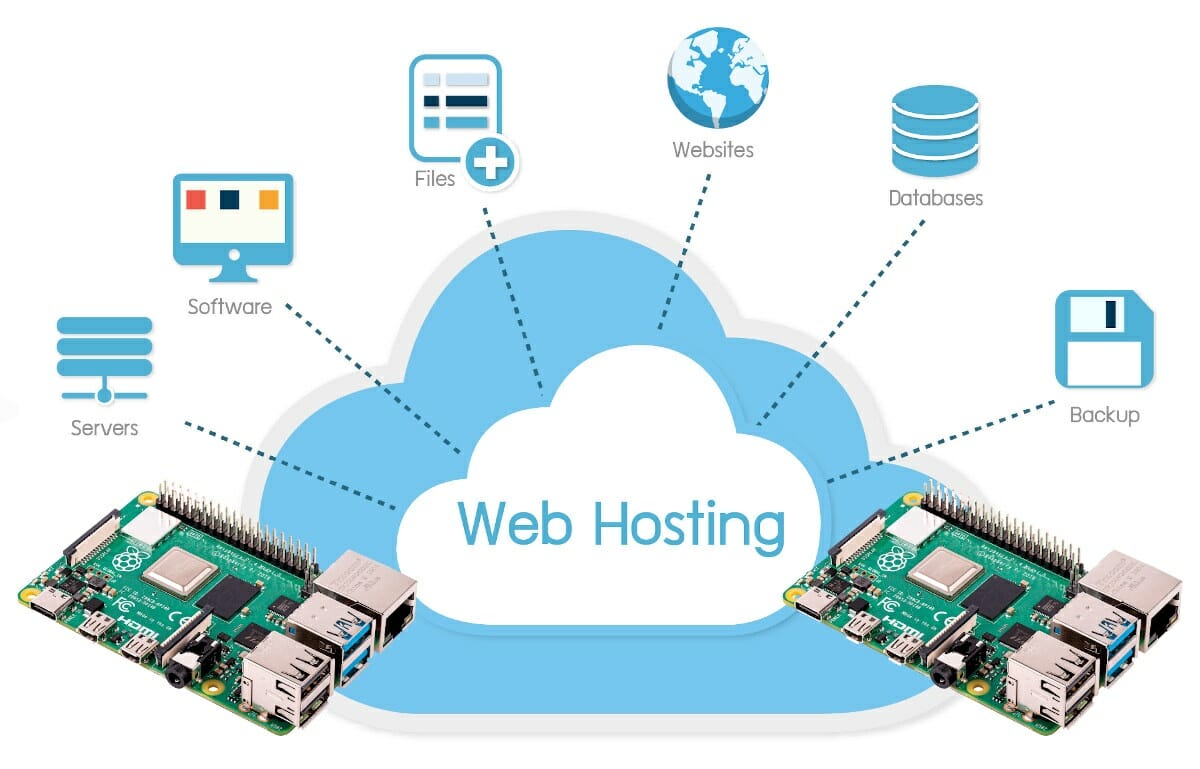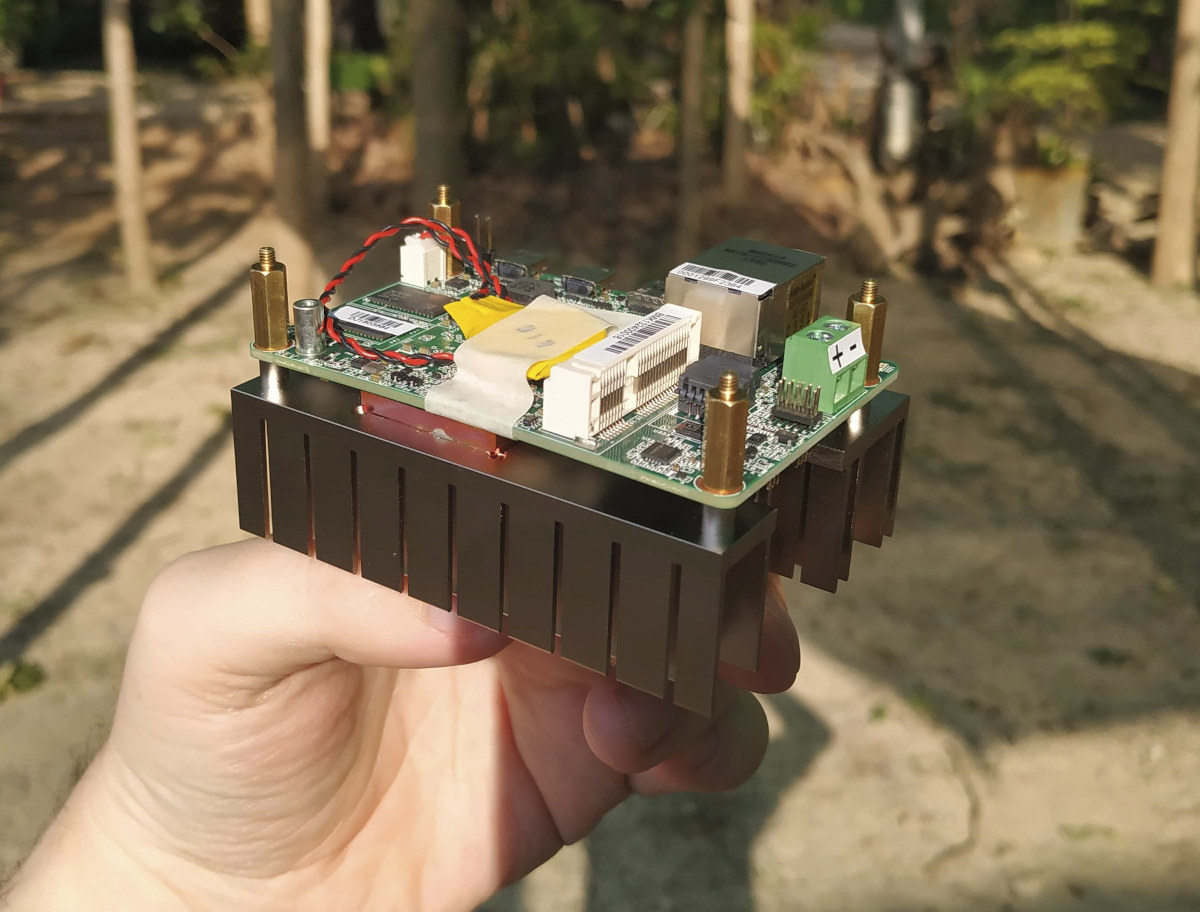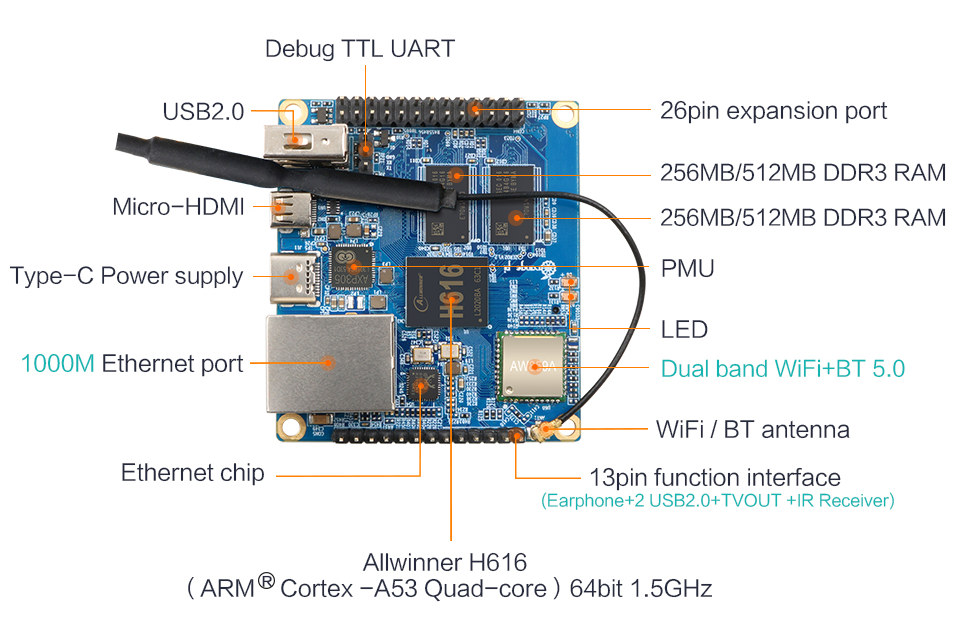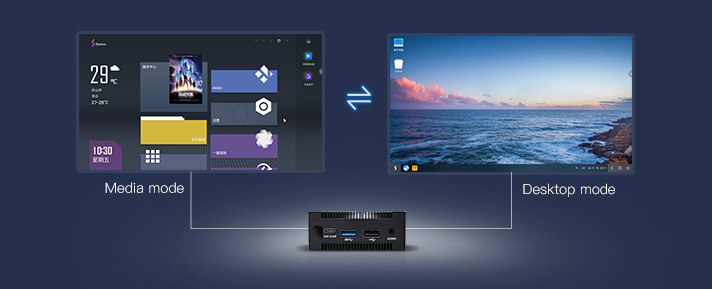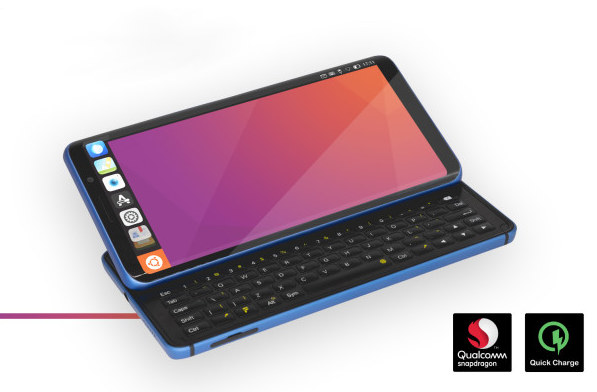FriendlyELEC NanoPi R2S SBC for headless applications with Rockchip RK3328 processor and dual Gigabit Ethernet ports is getting some competition, as with Orange Pi R1 Plus board, Shenzhen Xunlong Software has updated its Orange Pi R1 board powered by an Allwinner H2+ to RK3328 processor coupled with 1GB RAM, and offering dual Gigabit Ethernet ports, plus one USB port for router applications. Orange Pi R1 Plus board specifications with highlights in bold or stricken through showing differences against R1 board: SoC –Rockchip RK3328 quad-core Cortex-A53 @ 1.5 GHz with Arm Mali-450MP2 System Memory – 1GB DDR4 RAM Storage – MicroSD card slot, 16 MB SPI flash Connectivity – 2x Gigabit Ethernet via RTL8211E transceiver and RTL8153B USB 3.0 to Ethernet chip + 802.11 b/g/n WiFi (Realtek RTL8189ETV) with u.FL antenna connector and external antenna USB – 1x USB 2.0 port, 1x USB-C OTG port Expansion headers Unpopulated 26-pin “Raspberry Pi […]
NanoPi R4S SBC launched with optional metal case for $45 and up
We found NanoPi R4S board in a work-in-progress Wiki last month. The tiny single board computer is designed for headless applications but comes with much better specifications compared to similar boards with a Rockchip RK3399 hexa-core processor with up to 4GB RAM, dual Gigabit Ethernet, and USB 3.0 ports. At the time we had limited information, but FriendlyELEC has now started selling the board for $45 and up, together with an optional metal case for a fanless operation that should ensure very good cooling. Here’s a reminder of NanoPi R4S specifications: SoC – Rockchip RK3399 hexa-core processor with dual-Core Cortex-A72 up to 2.0GHz, quad-core Cortex-A53 up to 1.5GHz, Mali-T864 GPU with OpenGL ES1.1/2.0/3.0/3.1, OpenCL, DX11, and AFBC support, 4K VP9 and 4K 10-bit H265/H264 60fps video decoder System Memory – 1GB DDR3 or 4GB LPDDR4 Storage – MicroSD card slot Networking – 2x GbE, including one native Gigabit Ethernet, and […]
IKOULA hosts Raspberry Pi 4 “micro server” for 4.99+ Euros per month
Hosting services for Arm single board computers where you pay a monthly fee for a board, and have it hosted in a datacenter with Internet access and easy provisioning have been around for over six years. Last summer, we reported that Mythic Beasts and mini Nodes had added Raspberry Pi 4 hosting plans to their offerings, and others commented there were also other companies. But I’ve just been informed IKOULA, a hosting company based in France, had introduced Raspberry Pi 4 “micro server” hosting plans starting at just 4.99 Euros ex. VAT per month. The hosting plans include the following: Micro server – Raspberry Pi 4 SBC with 4GB DDR4 RAM Storage – 16GB SD card (optional 120 GB SSD) Connectivity – IPV6 only, with IPv4 as an option Bandwidth – 1 Gbit/s Availability – 99.95 % The company offers Raspbian (Raspberry Pi OS), Ubuntu 20.04 32-bit or 64-bit for […]
Reolink RLC-810A review – A 4K security camera with people & vehicle detection
Last week I received Reolink RLC-810A 4K smart security camera with support for people and vehicle detection. I listed the specifications and check out the content of the package of the first security camera I’ve received with artificial intelligence. That should be great to avoid all unnecessary alerts from motion detection I get from my “dumb” IP cameras. In this review, I’ll write a small guide showing how to use the camera with the Reolink app, the web interface, and check out RTSP and ONVIF support. I’ll also see if people and vehicle detection lives up to my expectations. Reolink RLC-810A Camera installation and setup As noted in the first part of the review, the camera does not come with a power adapter and does not support WiFi. So I had to find a 12V power adapter and used a 15-meter Ethernet cable to connect it to my router. Before […]
Giveaway Week – DFI GHF51 Ryzen Embedded SBC
Let’s end this year’s Giveaway Week with a bang courtesy of DFI GHF51 single board computer, that’s about the size of the Raspberry Pi, but is powered by an AMD Ryzen Embedded R1606G dual-core processor coupled with 4GB RAM and 32GB storage. With Gigabit Ethernet, dual micro HDMI output, and a single USB-C port, the board is clearly designed for industrial machines, digital signage, and robotics, but it can also be used as a standard computer via a USB-C hub. I tested the SBC with WIndows 10 Enterprise LTSC and Ubuntu 20.04, and it worked well in Windows, except for some issue with one of my USB hard drives where transfers would just stall from time to time. I had the same issue in Ubuntu plus some artifacts while running the UNIGINE 3D benchmark. For testing, I set up dual-boot for Windows 10 and Ubuntu 20.04, so considering there’s just […]
Orange Pi Zero2 Allwinner H616 SBC runs Android 10 or Linux
Last year, Shenzhen Xunlong Software unveiled Orange Pi Zero2 SBC as an update to the popular Orange Pi Zero board with a faster Allwinner H6 processor, HDMI 2.0 video output, USB 3.0 port, Gigabit Ethernet, and WiFi. Just one little problem: AFAIK they never sold it. But Orange Pi Zero2 board is now back with another design features instead equipped with a newer Allwinner H616 processor supporting Android 10, and various Linux distributions such as Ubuntu and Debian. Orange Pi Zero2 (2020) specifications: SoC – Allwinner H616 quad-core Arm Cortex-A53 processor @ up to 1.5 GHz with Arm Mali G31 MP2 GPU with support for OpenGL ES 3.2 and OpenCL 2.0 Memory – 512MB or 1GB DDR3 Storage – 2MB SPI flash and MicroSD card slot Video Output Micro HDMI 2.0a port up to 4Kp60 Video composite (CVBS) via 13-pin header (See Expansion section) Video Decoding 10-bit H265/HEVC up tp […]
Station P1 & M1 fanless mini PCs run media or desktop-optimized Android OS
T-Chip has recently introduced two fanless “Geek” mini PCs under their Firefly brand with Station P1 & M1 respectively powered by Rockchip RK3399 hexa-core processor, and RK3328 quad-core processor. Both mini PCs can run Firefly’s Station OS in either desktop or media mode, as well as Android or Ubuntu. There are also some community efforts to port Armbian and LibreELEC to the devices. Station P1 specifications Specifications: SoC – Rockchip RK3399 hexa-core processor with two Cortex A72 cores @ up to 1.8 GHz and four Cortex-A53 cores, Mali-T860 MP4 GPU with support for OpenGL ES1.1/2.0/3.0/3.1, OpenVG1.1, OpenCL, DX11, VPU with support for 4K H.265 10-bit 60fps video decoding, multi-channel 1080p video decoding and encoding System Memory – 4GB LPDDR4 dual-channel 64-bit RAM Storage – 32GB eMMC flash (16GB/64GB/128GB Optional), onboard 16MB SPI flash, MicroSD card slot Video Output HDMI 2.0a up to 4Kp60, HDCP 1.4/2.2 DisplayPort 1.2 up to 4Kp60 […]
F(x)tec Pro1 X smartphone runs LineageOS or Ubuntu, features a sliding keyboard (Crowdfunding)
F(x)tec Pro1 Android smartphone was introduced last year with the main differentiating features being its sliding keyboard. The company also mentioned support for Android-based LineageOS as well as Sailfish OS, but those need(ed) to be installed by the user. FX Technology has now unveiled F(x)tec Pro1 X smartphone with similar specs, except for the blue case and the option of having additional memory and storage, as well as official support for LineageOS and Ubuntu Touch thanks to a collaboration with XDA. Another difference is the availability of Scandinavian and AZERTY keyboard layouts F(x)tec Pro1 X specifications: SoC – Qualcomm Snapdragon 835 (MSM8998) octa-core Kryo 280 processor with 4x higher performance cores @ 2.45 GHz, 4x low-power cores @ 1.9 GHz, Adreno 540 GPU System Memory – 6GB or 8GB LPDDR4 Storage – 128GB or 256GB flash, MicroSD card up to 2TB Display – 5.99-inch 2160 x 1080 (FHD+) AMOLED display with […]


